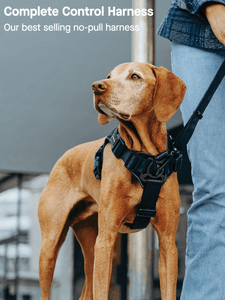Return to Blog
dog walking
Do Front Clip Dog Harnesses Work?
By Helium SEO on Sep 6, 2024
Front clip or no-pull dog harnesses are becoming an increasingly popular choice for dog parents looking to improve their walks and training experiences. These harnesses claim to offer better control over dogs who pull, making walks more enjoyable for both pet and parent. Do front clip harnesses actually stop pulling? This article explores the design, benefits, and potential drawbacks of front clip dog harnesses, as well as provides guidance on how to properly use them.
What is a Front Clip Harness?
A front clip harness is a type of dog harness with a leash attachment point on the chest. It's different from a back clip dog harness, which has the clip on the dog's back. Front clip harnesses are made to help stop dogs from pulling on walks. They work by turning the dog towards you when they try to pull, making it harder for them to keep going forward. This design gives pet parents greater control over their dogs, especially for strong pullers or dogs still learning to walk nicely on a leash.
The Design and Construction of Front Clip Harnesses
Front clip harnesses have a unique design to help discourage pulling. They usually have straps that go around the dog's chest and belly. The main feature is the front ring where you attach the leash. This ring sits on the dog's chest. Some harnesses are just front clip, while others are dual clip dog harnesses with both front and back attachment points. The straps are often made of strong materials. They also have adjustable straps for a good fit on different dog sizes.
The Advantages of Using a Front Clip Harness
Front clip harnesses have several benefits over regular collars or back clip harnesses. They can make walks more enjoyable for both dogs and their parents. Let's look at some of the main advantages of using a front clip harness.
Improved Control and Handling
Front clip harnesses give dog parents much better control over their pets. The front leash attachment makes it easy to steer your dog. This is super helpful for big dogs or strong pullers. This extra control can make walks less stressful, especially in busy areas.
The design of front clip harnesses also helps with training. When a dog pulls, the harness turns them towards you. This makes the dog pay attention to you instead of whatever they're trying to pull towards. Over time, this can help teach dogs to walk nicely without pulling. It's a gentler way to train than using prong collars or choke chains. Plus, it works with your dog's natural movements instead of against them.
Comfort and Safety for the Dog
Front clip harnesses are usually more comfy for dogs than regular collars. They spread the pressure across the dog's chest and body instead of just their neck. This is way safer, especially for dogs who pull a lot. It helps prevent neck injuries that can happen with collar pulling. The harness design also stops dogs from slipping out, which can happen with collars.
A good front clip harness should have a comfortable fit. Look for ones with padding on the chest and under the legs. Make sure to measure your dog and adjust the harness properly. A well-fitted harness shouldn't rub or chafe. It should allow full movement of the dog's front legs. Some harnesses even have reflective strips for safer night walks. Remember, a comfy dog is a happy dog, and a happy dog is more likely to enjoy walks and training.
How to Properly Use a Front Clip Harness
Proper fitting is essential for the comfort and effectiveness of a front clip harness. Here's a step-by-step guide to ensure a good fit:
- Measure your dog's chest girth just behind the front legs.
- Choose the appropriate size based on our sizing chart.
- Loosen all straps before putting the harness on your dog.
- Place the harness over your dog's head and secure any buckles.
- Adjust the straps to allow two fingers' width between the harness and your dog's body.
- Check that the front clip is centered on your dog's chest.
- Ensure your dog can move freely without the harness shifting or rubbing.
Remember, a properly fitted front clip harness should be snug but not tight. It shouldn't restrict your dog's movement or breathing. If you're unsure about the fit, consult with a professional for guidance.
For more on Front clip harnesses check out or front clip harness complete guide.


